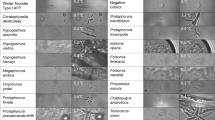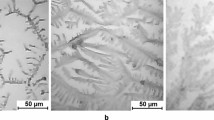Abstract
Low molecular weight glycoproteins isolated from serum of Antarctic fish have been shown1 to be responsible for freezing point depression which permits survival at temperatures down to −1.9 °C. The principal active antifreeze glycoprotein (AFGP) of several Antarctic species consists of a repeating tripeptide Ala-Thr-Ala with a disaccharide galactosyl-N-acetylgalactosamine linked to the threonine residue2–4. The AFGP is more effective in freezing-point depression on a weight basis than NaCl and several hundredfold more effective than ordinary proteins2. Melting point, however, is virtually unaffected by the AFGP5. We have investigated the possible role of proteinbound water in the unusual antifreeze activity of the AFGP. Ordinary proteins such as bovine serum albumin, haemoglobin, and lysozyme show hydration levels of about 0.4 g H2O per g protein6. This water does not freeze at temperatures down to −35 °C, but is sufficiently mobile to produce a measurable proton magnetic resonance signal. Quantitative determination of the amount of this ‘bound’ water is therefore possible in frozen protein solutions7. We have used this technique to examine water binding by the AFGP over a range of temperatures below the freezing point of bulk water.
This is a preview of subscription content, access via your institution
Access options
Subscribe to this journal
Receive 51 print issues and online access
$199.00 per year
only $3.90 per issue
Buy this article
- Purchase on Springer Link
- Instant access to full article PDF
Prices may be subject to local taxes which are calculated during checkout
Similar content being viewed by others
References
DeVries, A. L. & Wohlschlag, D. E. Science 163, 1073–1075 (1969).
DeVries, A. L., Komatsu, S. K. & Feeney, R. E. J. biol. Chem. 245, 2901–2908 (1970).
DeVries, A. L., Komatsu, S. K. & Feeney, R. E. J. biol. Chem. 245, 2909–2913 (1970).
DeVries, A. L., Vandenheede, J. & Feeney, R. E. J. biol. Chem. 246, 305–308 (1971).
DeVries, A. L. Science 172, 1152–1155 (1971).
Kuntz, I. D. & Kauzmann, W. Adv. Protein Chem. 28, 239–345 (1974).
Kuntz, I. D., Brassfield, T. S., Law, G. D. & Purcell, G. V. Science 163, 1329–1331 (1969).
Kuntz, I. D. & Brassfield, T. S. Archs Biochem. Biophys. 142, 660–664 (1971).
Cooke, R. & Kuntz, I. D. Ann. Rev. Biophys. Bioengng 3, 95–126 (1974).
Pennock, B. E. & Schwan, H. P., J. phys. Chem. 73, 2600–2600 (1969).
Derbyshire, W. & Duff, I. D. Faraday Disc. 57, 243–254 (1976).
Lynch, L. J. & Webster, D. S. J. Polymer Sci. Symp. No. 49, 43–63 (1975).
Kuntz, I. D. J. Am. chem. Soc. 93, 514–516 (1971).
Lin, Y., Duman, J. G. & DeVries, A. L. Biochem. biophys. Res. Commun. 46, 87–92 (1972).
Duman, J. G. & DeVries, A. L. Cryobiology 9, 469–472 (1972).
Lin, Y., Raymond, J. A., Duman, J. G. & DeVries, A. L. Cryobiology 13, 334–340 (1976).
DeVries, A., in Biochemical and Biophysical Perspectives in Marine Biology (eds Malins, D. C. & Sargent, J. R.) 289–330 (Academic, London, 1974).
Author information
Authors and Affiliations
Rights and permissions
About this article
Cite this article
HASCHEMEYER, A., GUSCHLBAUER, W. & DEVRIES, A. Water binding by antifreeze glycoproteins from Antarctic fish. Nature 269, 87–88 (1977). https://doi.org/10.1038/269087a0
Received:
Accepted:
Issue Date:
DOI: https://doi.org/10.1038/269087a0
This article is cited by
-
Phase change heat transfer of biological aggregates
Journal of Thermal Science (2002)
Comments
By submitting a comment you agree to abide by our Terms and Community Guidelines. If you find something abusive or that does not comply with our terms or guidelines please flag it as inappropriate.



